The number of concussions reported by college football athletic programs surveyed by The Atlanta Journal-Constitution varied widely — from 1 to 32 per year.
On the high side, Georgia Tech reported that its Yellow Jackets football players garnered a total of 32 concussions in calendar year 2014, and Georgia Southern's Eagles reported 28 in 2012.
On the low side, two of the schools surveyed by the AJC said they had academic or calendar years in which their entire football teams suffered just one concussion each: The SEC's University of Arkansas Razorbacks in 2011-12 and the University of West Florida's nascent Division II football program in 2014-15.
A couple of factors could contribute to the wide variance in numbers of concussions between schools.
First is the definition of a concussion, which is fairly broad.
The NCAA's "best practices" for diagnosis and management of concussions says it's "a change in brain function, following a force to the head, which may be accompanied by temporary loss of consciousness but is identified in awake individuals, with measures of neurologic and cognitive dysfunction."
All varsity student-athletes should have a one-time "baseline" assessment made before they start playing a sport, so that there's something to be compared to later on, the guidelines say. The NCAA also says players should be taken to the nearest hospital if they show the most serious symptoms, including losing consciousness for more than one minute, vomiting repeatedly, or scoring 12 or less on the 1-15 Glasgow Coma scale for eye movement, speech and motor responses.
Another factor may be the varying number of players between teams. Team size is capped by the NCAA according to the level at which each school competes.
Schools in the Division I Football Bowl Subdivision and Football Championship Subdivision — a group that would include the University of Georgia, Georgia Tech, Georgia State and Georgia Southern — are currently limited to a maximum of 105 "participants" on their football teams prior to the first game of the season (though there is a lower cap on how many of those participants can be granted athletic scholarships, 85 for FBS schools, 63 for the FCS).
Participants on a college football team would include student-athletes ranging from the starters to the players on the scout teams who help the other players practice.
Division II schools, such as Valdosta State and West Georgia, are currently limited to the equivalent of 36 full scholarships per year for the football team under NCAA regulations. Division III schools do not give athletic scholarships, though student-athletes are eligible for other types of financial aid.
The colleges and universities surveyed by the AJC who said they did not have records tracking concussions by sport were Southeastern Conference members Auburn, Ole Miss, Missouri, Mississippi State, LSU and Tennessee, and Atlantic Coast Conference members Florida State, North Carolina and Virginia. Also on the list is the New Jersey Institute of Technology, which, like most fellow members of the Atlantic Sun Conference, does not have a football team. (Atlantic Sun is the conference in which Kennesaw State competes for most sports, but its football team competes in the Big South Conference.)
The University of Georgia also said it does not currently track concussion totals by sport but did so for two years, ending in 2012, for part of a grant application, university officials said. The AJC obtained those two years of data from the university under the state's Open Records Act.
Several other schools denied the AJC access to their concussion data on specific grounds:
• Alabama, one of the nation's historically most successful college football programs, told the newspaper its data could not be made public due to “privacy rules.”
• Florida, another football powerhouse and one of Georgia and Alabama's SEC competitors, denied access to its concussion data on grounds that its football program is overseen not by the public university but by a separate, private nonprofit entity whose records are not subject to the Florida Sunshine Law.
• The University of Pittsburgh, commonly called Pitt, denied access to its data on grounds that it is a private institution with special "state-related" status and its records are not subject to the Pennsylvania Right-to-Know Law. As an ACC member, Pitt regularly competes against Georgia Tech.
• Delaware State, an NCAA Football Championship Subdivision school which competes against Savannah State in the Mid-Eastern Athletic Conference, said its concussion-related records were not subject to the Delaware Freedom of Information Act.
In addition:
• Kentucky, an SEC member, declined to release the requested data broken down by sport and released only totals for concussions in all sports. The university said release of the sport-by-sport numbers would violate federal student privacy laws.
• The University of Arkansas, also an SEC member, initially declined to release to the AJC its concussion data, citing a provision of Arkansas state law that says state government records are public only to citizens of Arkansas. The university later released the requested data to a journalist living in Arkansas who sought it on behalf of the AJC.
• The University of Tennessee, another SEC member, initially declined the AJC's request as well, as Tennessee also has a citizens-only provision to its public records law. When the AJC requested the data through a journalist living in Nashville, the university responded that it had no such records to turn over.
AJC Data Reporting Intern Stephanie Lamm and Data Specialist Jeff Ernsthausen contributed to this report.








